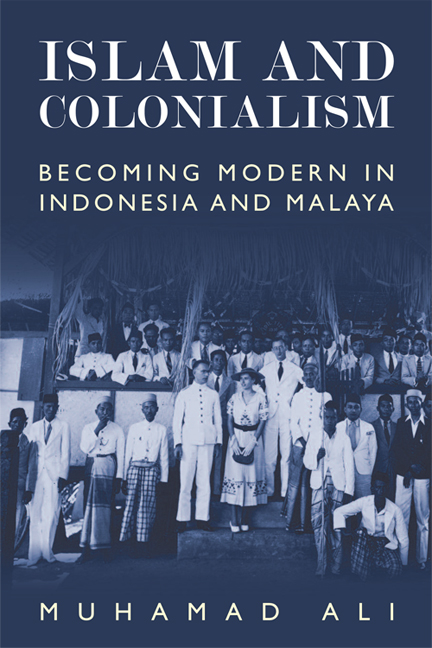Book contents
- Frontmatter
- Contents
- Glossary
- Acknowledgements
- List of Abbreviations
- Transcriptions and Orthography
- Map
- Introduction
- Part I Making Islam Modern
- I Organising Da'wah and Spreading Reform
- II Colonising the Muslim East and Reinforcing Culture
- Part II Modernising Politics and Government
- Part III Modernising Law
- Part IV Modernising Education
- Conclusion
- Bibliography
- Index
II - Colonising the Muslim East and Reinforcing Culture
from Part I - Making Islam Modern
Published online by Cambridge University Press: 05 September 2016
- Frontmatter
- Contents
- Glossary
- Acknowledgements
- List of Abbreviations
- Transcriptions and Orthography
- Map
- Introduction
- Part I Making Islam Modern
- I Organising Da'wah and Spreading Reform
- II Colonising the Muslim East and Reinforcing Culture
- Part II Modernising Politics and Government
- Part III Modernising Law
- Part IV Modernising Education
- Conclusion
- Bibliography
- Index
Summary
It would be a great satisfaction to me if my lectures might cause some of my hearers to consider the problem of Islam as one of the most important of our time, and its solution worthy of their interest and of a claim on their exertion.
(Snouck 1916: 150)The Malay cares nothing for consistency; he does not exchange old customs for new; he keeps both the new and the old. He is indeed afraid to give up the old.
(Wilkinson 1925a: 64)Scholars have suggested that one of the professed aims of European colonisation was ‘to inscribe the colonized in the space of modernity’ (Mbembe cited in Cooper 2005: 143; Scott and Hirschkind 2006: 291). ‘Colonial modernity’, as a category of analysis, was manifested partly in the act of knowing their colonial subjects and engaging them in the modern world. Much as Muslim reformers attempted to strengthen the faith and modernise local Muslim communities by establishing new forms of voluntary association and communicating ideas through print publications, Dutch and British colonial administrators and scholars studied the colonised as ‘object-like’, published information on them and ‘re-ordered’ them bureaucratically (Mitchell 1988: 33). As believers and natives, Muslim reformers talked about what ought to be done and many in the East Indies were generally involved in ‘movements’ and many in Malaya wrote essays in pursuit of progress, whereas Europeans became interested in Islam and local culture in order to bring them into the modern world. Islam and local culture influenced the ways in which European colonialists viewed and acted toward Muslim-majority colonies as well as toward their self-perceptions of the West and modernity.
In this chapter, I explore the way that European colonial administrators and scholars became interested in Islam and studied its textual, theological, historical and contemporary cultural expressions in the colonies. The colonisers were influenced in their discourses about the East by their observations of Islam and Muslim subjects as well as by their Christian background knowledge of Christianity and Western culture. In turn, readings of Islam and interaction with Muslims in the colonies shaped their views of the modern. Although some European scholars recognised scriptural, doctrinal and historical links between Islam and Christianity (and Judaism), they tended to conflate Islam with the East and traditionalism, and Christianity with the West and modernity.
- Type
- Chapter
- Information
- Islam and ColonialismBecoming Modern in Indonesia and Malaya, pp. 74 - 104Publisher: Edinburgh University PressPrint publication year: 2015

